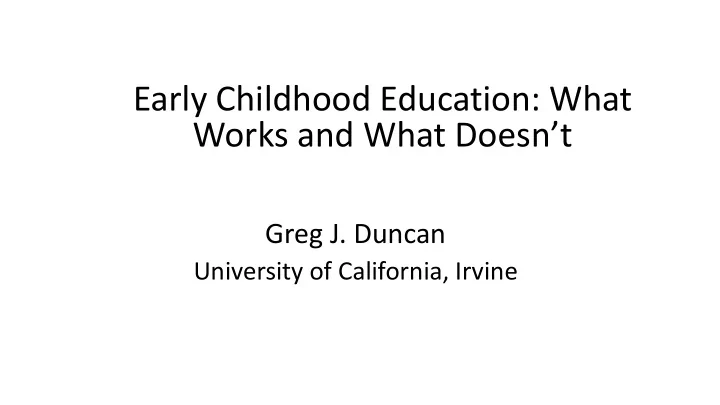

Early Childhood Education: What Works and What Doesn’t Greg J. Duncan University of California, Irvine
What problems do we want preschool programs trying to address? • Some would say – school readiness gaps • Others would say – lifetime disadvantage
Have I got some programs for you! • Short run: Boston pre-K eliminates short-run achievement gaps between low- and middle-income children • Long-run: Perry Preschool, Abecedarian and Head Start have generated large long-run benefits
Outline for talk • Short run: Best bets for policies that promote school readiness For short-run impacts, worry about curriculum and less about classroom structure Go for a play-based academically-oriented curriculum that also develops socioemotional skills.
Outline for talk • Longer-run: Can today’s programs repeat the long -run successes of past programs? Not by themselves. For longer-run impacts, scale up pre-K and integrate it with K-12 so that it becomes another (quite differently structured) year of school.
Policy Levers for School Readiness • Process quality regulation (e.g., QRIS) • Curriculum requirements and coaching
Process Regulation Policy Lever • Star-type ratings for quality based on structural characteristics and classroom observations (ECRS, CLASS) • No strong evidence that process quality improves school readiness substantially
Curriculum Policy Lever Types of curricula • Whole-child (used in 75% of Head Start and 40% of pre-K classrooms; called “Constructivist” by some) • Content-specific (e.g., math or literacy) (used in ~20% of Head Start and pre- K classrooms; not “Direct Instruction”) • Locally-developed
Impacts of Various Curricula on Academic Outcomes 0.50 Difference in Standard Deviation Units 0.25 0.00 Whole child Math + Math vs. Literacy vs. curricula vs. literacy vs. whole-child whole child locally whole-child developed -0.25 Source: Nguyen’s (2016)
Impacts of Various Curricula on Academic Outcomes 0.50 Difference in Standard Deviation Units Whole child 0.25 curricula vs. locally developed 0.00 Math + Math vs. Literacy vs. ns literacy vs. whole-child whole child whole-child -0.25 Source: Nguyen’s (2016)
Impacts of Various Curricula on Academic Outcomes 0.50 Difference in Standard Deviation Units Whole child 0.25 curricula vs. locally developed 0.00 Math + Math vs. Literacy vs. ns literacy vs. whole-child whole child whole-child -0.25 Source: Nguyen’s (2016)
• Short run: Best bets for policies that promote school readiness For short-run impacts, worry about curriculum and less about classroom structure Go for a play-based academically-oriented curriculum that also develops socioemotional skills.
Short- vs. Long-run Effectiveness: Can today’s programs produce long-run gains??? Probably not without close coordination with K-12 schooling
Building Blocks Math Impacts 0.75 .63 sd 0.50 0.25 0.00 4 5 6 7 8 9 10 Age Solid marker p<.05
Building Blocks Math Impacts 0.75 .63 sd 0.50 0.25 0.00 4 5 6 7 8 9 10 Age Solid marker p<.05
Fade out in cognitive impacts in 67 ECE studies 0.40 End of program Effect size in sd units 0.30 0.23 0.20 0.10 0.09 0.05 0.06 0.10 0.00 0 0-1 1-2 2-4 4+ Years since end of treatment Solid marker denotes p<.05. Source: Li et al. (2017)
Huge disappointment Why the fadeout/catch-up? • Academic skills taught in pre-K are quickly learned in K • Need to teach basic skills AND be a “charging station” for pre -K skills • Need curriculum alignment and coaching how to teach children with different math skills
Non-solutions: • Turn preschool into a stressful, worksheet-laden, regimented mini-elementary school
Possible ways of sustaining pre-K impacts: • Train preschool and early-grade teachers to teach numeracy and literacy • Use proven play-based pre-K curricula • Integrate and (co-locate?) preschool and K-3 instruction • Focus on Common Core-type learning goals and use preschool to prepare children for them
Greg J. Duncan gduncan@uci.edu School of Education University of California, Irvine
Recommend
More recommend